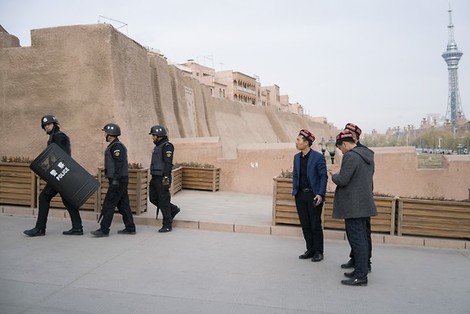Your podcast discovery platform
Curious minds select the most fascinating podcasts from around the world. Discover hand-piqd audio recommendations on your favorite topics.

piqer for: Globalization and politics Global finds
Sezin Öney, originally from Turkey, is based in Budapest and Istanbul. She her journalism career as a foreign news reporter in 1999 and she turned into political analysis as a columnist since 2007. Her interest in her main academic subject area of populism was sparked almost decade ago; and now she focuses specifically on populist leadership, and populism in Turkey and Hungary. She studied international relations, nationalism, international law, Jewish history, comparative politics and discourse analysis across Europe.
Twelve Days In Xinjiang: How China's Surveillance State Overwhelms Daily Life
"Twelve Days in Xinjiang" could have been the title of an apocalyptic dystopia, and this is indeed the picture this article is depicting. This is the story of a city in China where state surveillance through the use of latest digital technology is overwhelming—even by China's standards.
Xinjiang is the capital of the autonomous region of Urumqi. It is located in the northwestern part of China and populated predominantly by the Muslim Uighur ethnic group. The Chinese state has long held security concerns for the area ranging from separatism to radicalism. And now, according to the authors, Xinjiang has turned into "a laboratory for high-tech social controls that civil-liberties activists say the government wants to roll out across the country". Chin and Bürge state that, in this "laboratory", it is "nearly impossible to move about the region without feeling the unrelenting gaze of the government".
And what does this "unrelenting gaze" mean?
It means a city with: security checkpoints with identification scanners guarding the public transport and roads leading towards and out of town; facial scanners tracking entrances to hotels, shopping malls and banks; security officers using hand-held devices to scan smartphones for politically charged and other "suspicious" content and/or encrypted chat applications; and the requirement of swiping identity cards and displaying faces in certain shopping activities like buying gas.
While such a high degree of surveillance may seem extraordinary and unique for a remote part of China, this may indeed be the reality of many places across the globe in the future. Ever expanding possibilities of technology are already used to track down daily activities of basically "ordinary citizens" to varying degrees by governments. And where is the limit to security concerns? How might the balance between security and freedoms be established? These questions that concern us all: today it is Xinjiang, China, and far away. But how about tomorrow?
Stay up to date – with a newsletter from your channel on Globalization and politics.
